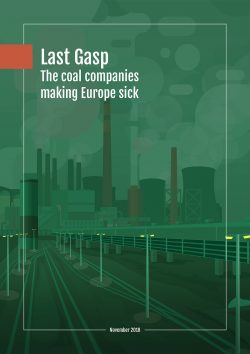19 November 2018
Europeans paying tens of billions in health costs for coal-fired electricity
BERLIN, 20 November 2018 – European coal companies including RWE, EPH, and PGE, continue to push the cost of dirty energy onto society, with air pollution from their coal plants burdening people across Europe with both health problems and billions in costs, according to modelling detailed in a new report.
Titled “Last Gasp: The coal companies making Europe sick”, the report tallies up the hidden cost of the coal these companies burn, using state-of-the-art emission and weather data modelling to make each one’s responsibility clear. [1] According to this, just ten companies were responsible for two-thirds of the health impacts of electricity production from coal in 2016, with the 91 coal plants they operate being behind 7,600 premature deaths, 3,320 new cases of chronic bronchitis, 137,000 asthma symptom days in children, and up to €22 billion in costs. [2]
“The two worst companies are Germany’s RWE and EPH. They burn more coal than anyone else, they burn it in highly populated regions, and they burn lignite – the dirtiest coal. These results underline the urgency with which governments like Germany’s must treat this issue, and phase-out coal as quickly as possible. We have an air pollution crisis, and human health must be prioritised,” said Dave Jones, lead author of the report and European power and coal analyst with Sandbag.
“Coal utilities like Germany’s RWE know very well the health problems they are responsible for. But as this report shows, the impact of their pollution is far broader and more serious than is generally understood. Europe is a densely-populated region, and a coal plant in any one country threatens the health of people all over Europe,” said Kathrin Gutmann, Campaign Director for Europe Beyond Coal. “Ambitiously phasing out coal plants by or before 2030 will improve health outcomes for countless people.”
With an estimated 5,820 hospital admissions and over two million lost working days attributable to coal pollution, coal companies are also responsible for significant health costs that society is forced to pick up. These are similar in magnitude to the revenues that they get for selling their coal-fired electricity — or well in excess of it. For example, around €48 of health costs per MWh generated from coal are attributable to RWE [3], compared to a wholesale electricity price of around €50/MWh in Germany.
“Air pollution and climate change share a common driver: Coal. As both worsen, the costs to citizens grow. Like the IPCC’s recent warning that we only have 12 years to move beyond coal, this report makes the coal companies’ responsibility for air pollution crystal clear, as well as the duty of our decision makers to hold them accountable. They can both start protecting human health and the climate today, by ceasing investment into coal, by ending lobbying efforts for longer plant lives and yet more subsidies, and by committing to an ambitious and just transition away from coal by 2030 the latest,” said Nina Stros, EU Coal Campaign Lead at Greenpeace Central and Eastern Europe.
ENDS
Contacts:
Greg McNevin, Communications Director, Europe Beyond Coal (English)
[email protected], +49 1605 247 857
Dave Jones, Lead Author and European Power and Coal Analyst, Ember (English)
[email protected], +44 (0) 7586 947111
Kathrin Gutmann, Campaign Director, Europe Beyond Coal (German, English)
[email protected], + 49 (0) 1577 836 3036
Isis Wiedmann, Press Officer at Greenpeace Central and Eastern Europe (German, English)
[email protected], +49 (0) 1765 386 2544
Lauri Myllyvirta, Greenpeace Global Air Pollution Unit, Lead Health Impact Analyst
[email protected], + 358 (0) 50 3625 981
Anton Lazarus, Communications Officer, European Environmental Bureau
[email protected], +32 2 790 88 18
Joanna Flisowska, Coal Policy Coordinator, Climate Action Network (CAN) Europe (Polish, English)
[email protected], +48 698 693 170
About:
Last Gasp: The coal companies making Europe sick is published by Climate Action Network Europe and was written and endorsed by Europe Beyond Coal, Sandbag, Greenpeace Central and Eastern Europe, and the European Environmental Bureau. Find the report and more quotes here: beyond-coal.eu/last-gasp
Europe Beyond Coal is an alliance of civil society groups working to catalyse the closures of
coal mines and power plants, to prevent the building of any new coal projects and hasten the just transition to clean, renewable energy and energy efficiency. Our groups are devoting their time, energy and resources to this independent campaign to make Europe coal free by 2030 or sooner. beyond-coal.eu
Notes:
- The health impact methodology used in the report is guided by recommendations from the World Health Organization Europe’s “Health risks of air pollution in Europe” (HRAPIE) project on health impact assessments for air pollution. It includes atmospheric modelling with the European Monitoring and Evaluation Programme Meteorological Synthesizing Centre – West (EMEP MSC-W) computer model, which is also used by the European Environment Agency for European Commission assessments of health impacts from air pollution in Europe. This report does not attempt to quantify actual health occurrences nor their actual costs.
- While four of the ten most polluting companies have their main coal plants in Germany (RWE, EPH, Uniper and Steag), RWE remains the most damaging to human health by a wide margin. Three companies are from Poland (PGE, ENEA and ZE PAK), and there is one each from Spain (Endesa), Czech Republic (ČEZ) and Bulgaria (Bulgarian Energy Holding). German coal companies dominate the list because the country alone is responsible for 36% of all coal-based electricity generation in the EU.
- It is estimated that RWE alone caused up to €5.4 billion of associated health costs in 2016, and there are eight coal companies: EPH, PGE, ČEZ, Uniper, Endesa, ENEA, Steag and ZE PAK, with health costs of over a billion Euros each. These costs are not covered by the companies, but rather by society in the form of increased national healthcare budgets, personal costs for individual treatment and economic losses caused by reduced productivity.

